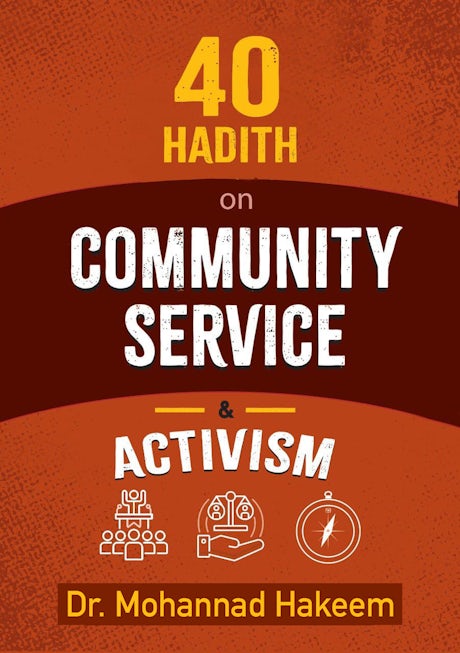Burnout in Islam
PROTECTION FROM BURNOUT
Abu Juhayfah related that the Prophet, may Allah bless him and give him peace, created a bond of fellowship between Salman and Abu al-Darda’. Salman visited Abu al-Darda’ and found his wife Umm al-Darda’ dressed in worn-out clothing.
He asked her why she was like this. She said, ‘Your brother Abu al-Darda’ is not interested in the luxuries of this world.’ Then Abu al-Darda’ entered and prepared a meal for Salman. Salman asked Abu al-Darda’ to eat with him but he said, ‘I am fasting’. Salman said, ‘I will not eat until you eat.’ So Abu al-Darda’ broke his fast and ate with him.
When night-time arrived, Abu al-Darda’ stood for prayer but Salman asked him to sleep, and Abu al-Darda’ slept. After a while, Abu al-Darda’ arose again but Salman asked him to sleep. When it was the last hours of the night, Salman asked him to get up and they both offered the night prayer. Salman said to him, ‘You have a duty to your Lord, you have a duty to your body, and you have a duty to your family, so you should give each one its rights.’ Abu al-Darda’ came to the Prophet and told him the whole story, and the Prophet, may Allah bless him and give him peace, commented, ‘Salman is correct.’
COMMENTARY
Salman’s advice in this narration is an essential reminder for community workers and activists who tend to deprioritize personal or family duties to teach a class, attend a meeting or travel for an event. It is a well-known fact that Islam teaches us to sacrifice our time, money and leisure for the sake of the community. However, such sacrifice shall not result in neglecting other responsibilities in life. We need to apply the shepherd mindset and make sure that we tend to the flock we are responsible for.
The incident between Salman and Abu al-Darda’ shifts the discussion from balancing family with community or worship and personal time into one of giving each duty its right. We should not be forced into a zero-sum game where we prefer one option while feeling guilty about the other.
Moreover, Islam’s holistic definition of worship includes many other activities, as long as they are permissible and done with the right intention. This was verified in this hadith when the Messenger of Allah, may Allah bless him and give him peace, told the Companions, may Allah be pleased with them:
‘And in a man’s intimate relations with his wife, is charity.’ They said, ‘O Messenger of Allah, is there a reward for one who satisfies his passions?’ The Prophet said, ‘You see that if he were to satisfy his passions with the unlawful, it would be a burden of sin upon him? Likewise, if he were to satisfy himself with the lawful, he will have a reward.’ (Muslim)
In other words, seeking balance in fulfilling our duties is the best way to worship Allah and closest to the Sunnah of his Messenger, may Allah bless him and give him peace: Anas ibn Malik (RA) related that some of the Companions of the Prophet, may Allah bless him and give him peace, asked the wives of the Prophet about deeds that he performed in private.
Some said, ‘I will not marry women.’ And some said, ‘I will not eat meat.’ And some said, ‘I will never sleep in a bed.’ The Prophet praised and glorified Allah, and he said, ‘What is the matter with some people who say this? I pray and I sleep, I fastand I break fasting, and I marry women. Whoever does not desire my Sunnah is not part of me.’ (Muslim)
Ibn al-Qayyim has a beautiful commentary where he says: For every command that Allah has given, Satan will try to send it into one of two extremes: either complete abandonment and neglect (tafrit), or to overzealousness and excessive application (ifrat). The religion of Allah is meant to stay on the moderate path between those who neglect its commands and those who are fanatical about them.
It is very important, when discussing balance, that we understand Salman’s advice and put it in context. The discussion was about voluntary prayers and fasting not affecting his relationship with his wife and his family. Balance should not become an invitation to abandon the obligatory (fard) commands of the faith, such as the five daily prayers, modest clothing for men and women and staying away from the impermissible.
ACTION ITEMS AND FURTHER DISCUSSION
- Reflect on the following prophetic advice on setting long-term goals, and ensuring sustainability and consistency in our deeds, habits, activities, education and programs: ‘The traveller who pushes his animal faster than its capacity will not reach his destination, nor will he be able to use it for future journeys.’ (hadith, rated as weak in transmission)
- Our responsibilities towards our community and our involvement in public activities should not become an excuse to escape from well-known duties, especially towards our immediate family members:
Believers, guard yourselves and your families against a Fire fuelled by people and stones. (al-Tahrim 66: 6)
It might be easier to preach at the mosque or teach other people’s kids than your own. However, the real challenge and the real impact come when we give our attention to our family members, even those who might disagree completely with us. We should not lose sight of the strong emphasis in Islam on keeping ties of kinship, as in the hadith:
‘A’ishah reported that the Messenger of Allah, may Allah bless him and give him peace, said, “The bond of family is suspended from the Throne and it says: Whoever upholds me, Allah will uphold him. Whoever severs me, Allah will sever him.”’ (Bukhari)
- The balance taught by this hadith was hard to maintain even among the Companions, may Allah be pleased with them. Some of them felt guilty about the times when they felt less spiritual or became distracted from the Hereafter with worldly enjoyments.
Hanzalah reported that he asked: O Messenger of Allah, when we are in your presence and are reminded of Hellfire and Paradise, we feel as if we are seeing them with our very eyes, but when we leave you and attend to our wives, our children, and our business, most of these things slip from our minds. The Prophet replied, By Him in whose hand is my soul, if your state of mind remains the same as it is in my presence and you are always occupied with the remembrance of Allah, the angels will shake your hands in your beds and roads. O Hanzalah, rather time should be devoted to this and time should be devoted to that. (Muslim)
This excerpt is from 40 Hadith on Community Service & Activism
Dr. Mohannad Hakeem - 9781847741592



